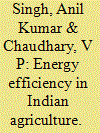| Srl | Item |
| 1 |
ID:
129917


|
|
|
| 2 |
ID:
150037


|
|
|
|
|
| Summary/Abstract |
Solar cooking technology has been promoted as a solution to both global poverty and environmental degradation, but relatively little research exists on the impact of solar oven usage on biomass fuel consumption. This study evaluates solar oven usage and wood consumption in northern Nicaragua during both the rainy and dry seasons, using surveys, temperature dataloggers, and direct measurements of fuelwood use. Solar oven owners reported usage on 79% of days during the dry season, and 41% of days during the rainy season. Comparison with oven temperature records confirmed usage on 50% of days during the dry season, and 16% of days during the rainy season. However, wood consumption measurements showed no statistically significant difference between days with solar oven usage and days without, suggesting that frequency of usage alone is not an appropriate proxy for fuel savings. Survey results suggest that a large part of solar oven usage came in addition to biomass cooking, as opposed to replacing it. These results suggest a need for further study of wood consumption in situ and more focus on the specific kinds of foods prepared in solar cookers, as well as local cultural and climatic conditions.
|
|
|
|
|
|
|
|
|
|
|
|
|
|
|
|
| 3 |
ID:
126514


|
|
|
|
|
| Publication |
2013.
|
| Summary/Abstract |
In developing countries households and institutions heavily rely on biomass to satisfy their energy needs. The unsustainable use of biomass is accompanied by several negative health and environmental impacts. As a clean energy source, solar cooking presents one alternative solution. In spite of its multiple benefits; however, solar cookers have experienced little success. Curiously, there has been little discussion about this in academic circles. Most research concerns technical improvements of solar cookers, rather than on the reasons why these cookers are not actually adopted in the field. This paper fills the gap by developing a comprehensive list of variables that influence the adoption of solar cooking: (1) economic, (2) social, (3) cultural, (4) environmental, (5) political and (6) technical. Furthermore, we can see that some solar cooking promoters are able to control for some of the variables (e.g., environmental factors), but not others (e.g. technical, social and cultural factors). The latter can only be captured through a needs assessment of the target group. This sort of assessment is a demanding but necessary step for the successful outcome of a solar cooking project.
|
|
|
|
|
|
|
|
|
|
|
|
|
|
|
|